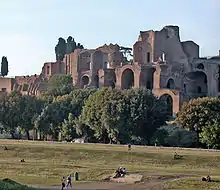palace
English

Etymology
From Middle English paleys, from Old French palais, which comes from Latin palātium, from Palātium, in reference to the Palatine (Palatine Hill), one of the seven hills of Rome, where the aristocracy of the Roman Republic—and later, Roman emperors—built large, splendid residences[1][2]. The name is ultimately either from Etruscan, the same source as Pales (“Pales, the Italic goddess of shepherds, flocks and livestock”), or Latin palus (“stake; enclosure”). Doublet of palazzo and Pfalz.
Pronunciation
- IPA(key): /ˈpælɪs/
- (General Australian, weak vowel merger) IPA(key): /ˈpæləs/
Audio (US) (file) - Rhymes: -ælɪs
- Hyphenation: pal‧ace
Noun
palace (plural palaces)
- Official residence of a head of state or other dignitary, especially in a monarchical or imperial governmental system.
- A large and lavishly ornate residence.
- 1834, L[etitia] E[lizabeth] L[andon], Francesca Carrara. […], volume I, London: Richard Bentley, […], (successor to Henry Colburn), OCLC 630079698, page 293:
- On Madame de Mercœur's arrival at the palace she found the carriage and guards in waiting, the Queen having decided that she would do her niece the honour of going to meet her.
- 1963, Margery Allingham, chapter 1, in The China Governess:
- The original family who had begun to build a palace to rival Nonesuch had died out before they had put up little more than the gateway, […].
-
- A large, ornate public building used for entertainment or exhibitions.
Derived terms
- Crystal Palace
- palace politics
- palace revolution
- palatial
- puck palace
Translations
| ||||||
Verb
palace (third-person singular simple present palaces, present participle palacing, simple past and past participle palaced)
- (archaic) To decorate or ornate.
- 1921, Kenneth Morris, The Crest-Wave of Evolution:
- And this Great King was a far-way, tremendous, golden figure, moving in a splendor as of fairy tales; palaced marvelously, so travelers told, in cities compared with which even Athens seemed mean.
- 1874, Benj. N. Martin, Choice Specimens of American Literature, And Literary Reader:
- May, with her green lap full of sprouting leaves and bright blossoms, her song-birds making the orchards and meadows vocal, and rippling streams and cultivated gardens; June, with full-blown roses and humming-bees, plenteous meadows and wide cornfields, with embattled lines rising thick and green; August, with reddened orchards and heavy-headed harvests of grain, October, with yellow leaves and swart shadows; December, palaced in snow, and idly whistling through his numb fingers;-all have their various charm; and in the rose-bowers of summer, and as we spread our hands before the torches of winter, we say joyfully, "Thou hast made all things beautiful in their time."
-
References
- Palatine#Derivative_terms
- https://www.oxford-royale.co.uk/articles/14-fascinating-word-origins-english-language.html
French
Etymology
From English palace, itself from Old French palais. Doublet of palais.
Pronunciation
- IPA(key): /pa.las/
Noun
palace m (plural palaces)
- luxury hotel
Descendants
- → Turkish: palas
Further reading
- “palace”, in Trésor de la langue française informatisé [Digitized Treasury of the French Language], 2012.
Middle English
Noun
palace
- Alternative form of paleys